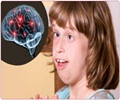More than 500 people participated in the annual walkathon for Autism. It affects one in 68 children in the United States and over 50,000 people in Alabama.

Norma Pedersen with the Autism Society said that families look forward to this walk every year because of the resources that are provided to them.
"We have a First Friend’s Day where our kids can meet, greet, interact with and learn about [autism], so there’s just a lot going that’s very educational and beneficial and helpful to families and to the general public to learn about autism."
More than 60 vendors participated by donating 10% percent of their proceeds to support the Autism Society. The local chapter holds monthly meetings with free childcare for families affected by autism.
One in 68 U.S. children has an autism spectrum disorder (ASD). Autism is the fastest growing developmental disability in the U.S, and affects over 50,000 people in Alabama alone.
 MEDINDIA
MEDINDIA


 Email
Email






